MENNO VON BRUCKEN FOCK
GARY GREEN, oeuvre Gentle Giant
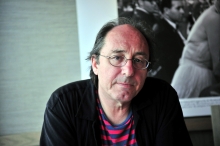
Het huidige millennium wordt voor wat betreft de progressieve muziek gekenmerkt door een grote hoeveelheid tributebands, die de muziek spelen van bands als Genesis, Yes, Pink Floyd, Camel en Rush en zo de aandacht voor de werken van deze pioniers uitstekend in stand houden. Ook hebben we, als liefhebbers van dit genre, ons kunnen verheugen in de wederopstanding van sommige bands of leden van bands die de muziek van toen weer zijn gaan spelen: Steve Hackett speelt Genesis, Annie Haslam vertolkt Renaissance, Roger Waters speelt Pink Floyd en Gary Green en Malcolm Mortimore spelen de muziek van Gentle Giant. De band die voor vele gerenommeerde bands een voorbeeld is geweest, zoals bijvoorbeeld Saga, Spock's Beard en Transatlantic. In iO Pages nr. 120 is te lezen hoe het einde van Simon Dupree & The Big Sound het begin was van Gentle Giant. Een band die buiten het circuit van het hitjes schrijven wilde blijven en bestond uit de drie broers Phil, Ray en Derek Shulman, Kerry Minnear, Gary Green en Martin Smith. De laatste werd evenwel snel vervangen door Malcolm Mortimore, die op zijn beurt weer vrij snel werd vervangen door John Weathers. Tegen het einde van de jaren zeventig werd de belangstelling voor progressieve muziek minder en zijn veel bands opgehouden te bestaan al dan niet na het maken van een knieval richting commercie. Zo ook de leden van Gentle Giant die in 1980 de handdoek in de ring gooiden.
Met de komst van het internet bleken er wereldwijd heel veel fans van Gentle Giant te bestaan die er behoefte aan hadden om hun bewondering voor deze band handen en voeten te geven. Zo ontstond een unieke fanclub: GORGG (Global On Reflection Giant Gathering) die vanaf 1999 jaarlijks een ontmoeting organiseert waarbij de muziek van Gentle Giant centraal staat en voormalige leden steevast worden uitgenodigd. Op het luxe cruise schip de MSC Divina had ik tijdens de 'Cruise To The Edge' het voorrecht een lang gesprek te mogen hebben met Gary Green, de voormalige gitarist van dit fameuze gezelschap, waarbij de rol van Fred Rosenkamp, gitarist van Lady Lake en fanatiek GORGG-lid, niet onvermeld mag blijven. Hij heeft mede dit interview mede mogelijk gemaakt.
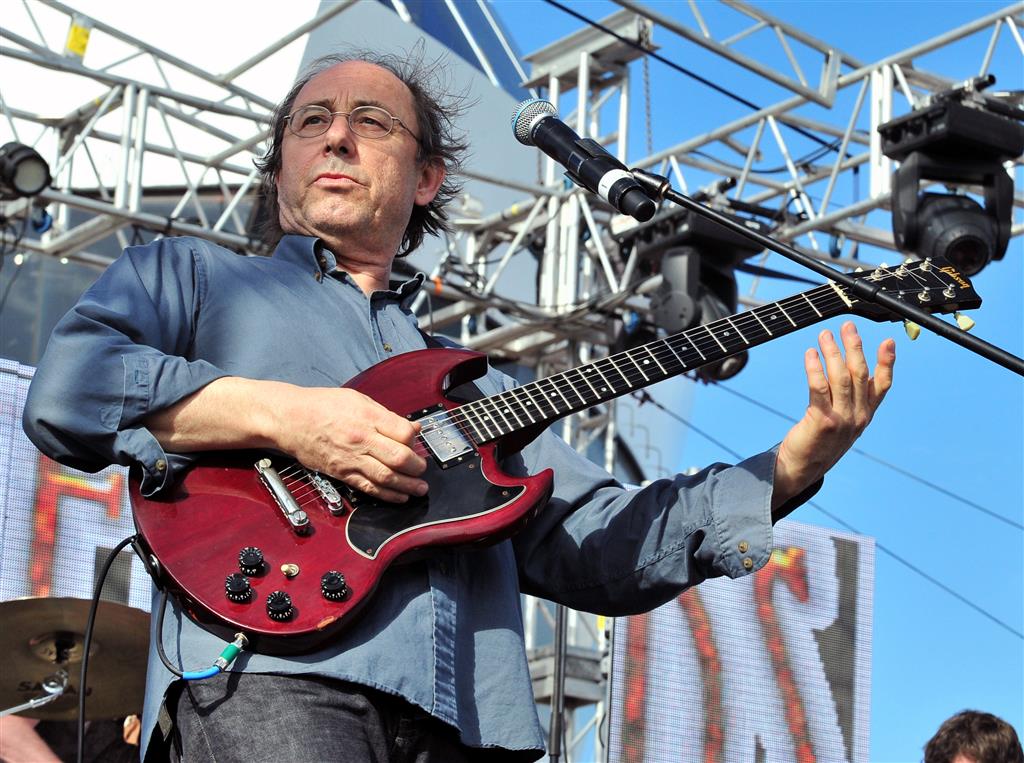
Gary, zou je willen beginnen met te vertellen hoe Gentle Giant werd ontbonden?
"We kwamen bijeen in New York om een tournee door de VS te maken toen zowel Kerry als Derek mededeelden dat ze niet meer wilden toeren. Dat betekende feitelijk dat die tournee ook onze laatste zou worden. Terugkijkend denk ik dat er volkomen legitieme redenen aan hun besluit ten grondslag lagen: Kerry was getrouwd en had jonge kinderen en had altijd al een hekel aan toeren gehad. Derek was net getrouwd en had er ook gewoon genoeg van om altijd ver van huis te zijn. In die laatste tournee ontstonden er in feite twee kampen: enerzijds Ray, John en ik die graag door zouden willen gaan, anderzijds Kerry en Derek die het wel welletjes vonden."
Heeft Phil Shulman die al eerder uit de band stapte hierin nog eeen rol gespeeld?
"Nee, absoluut niet. Phil was een stuk ouder dan wij, zo'n tien jaar, en dat was toentertijd bijna een generatie. Hij stapte uit de band om vergelijkbare redenen: getrouwd, kinderen en hij was zowel met Simon Dupree als met Gentle Giant (GG) al heel veel onderweg geweest. Hij is in 1974 in goede harmonie zijn eigen weg gegaan. Het was trouwens wel even spannend want Derek en Ray waren zo onder de indruk van Phils besluit dat ze overwogen om de band op te heffen. John en ik wilden absoluut doorgaan. Phil had weliswaar een mooie stem, maar verder waren zijn bijdragen op saxofoon niet van doorslaggevend belang. Er was een korte pauze en toen hebben we met In A Glass House de draad gelukkig weer opgepakt."
John Weathers is allang niet meer in staat om te drummen vanwege cerebro-spinale ataxie, waarbij je langzaamaan de controle over je ledematen verliest. Malcolm kennelijk wel: hoe ben je met hem in contact gekomen?
"Door het internet kwamen fans van GG in contact met elkaar; er ontstond een soort nieuwsbrief en uiteindelijk leidde dit intensieve verkeer tot de eerste GORGG bijeenkomst in New York in 1999, waarbij ik overigens niet aanwezig was. Dit bleek een dusdanig groot succes dat het jaar erop een bijeenkomst werd georganiseerd in Londen, waarbij ook John Weathers, Ian Underwood en Kerry Minnear aanwezig waren. Dankzij een verkennend bezoekje van Lesley Minnear werd Kerry overgehaald om ook te komen (Gary en Fred grijnzen want het bleek een heel geregel te zijn geweest om Kerry er toe te bewegen om te komen - MvBF). Enfin, het was bijzonder genoeglijk en deze GORGG-meetings zouden een jaarlijks terugkerend evenement worden. Mijn eerste GORGG was in 2001 in Toronto en de reden voor mij om te komen was de aanwezigheid van John Weathers die ik inmiddels ook tientallen jaren niet had gezien. Brieven schrijven deden we immers niet en in de jaren tachtig was intercontinentaal telefoneren belachelijk duur en was er nog geen e-mail. Die ontmoeting met John en ook met de fans was voor mij ook een openbaring. Mijn vrouw Judy en ik zijn naar Toronto gereden en zijn bijna een week met John opgetrokken. Man, wat hebben we gedronken en gelachen! In 2004 besloot John zo'n ontmoeting te organiseren bij hem thuis in Wales en bleken ook Malcolm Mortimore en zijn vrouw Lynn te zijn uitgenodigd. Zo kwam ik dus na ruim 32 jaar weer in contact met Malcolm. Hij was al die jaren professioneel muzikant geweest en hij is dat nog. Hij bleek iemand te zijn met een sterke wil en dito motivatie. Door deze bijeenkomsten was Malcolm ook weer oude GG gaan luisteren en was met een paar van zijn vrienden enkele GG nummers gaan spelen. Op een oudejaarsavond had hij een stel vrienden uitgenodigd, onder wie ikzelf. Omdat ik toevallig op dat moment in Engeland was, ik woon immers al jaren in Illinois, kon ik op zijn uitnodiging in gaan, want we waren dankzij GORGG al die tijd in contact gebleven. Er ontstond een jam en ik ben mee gaan spelen. Dat klonk zo goed dat Malcolm en ik tegen elkaar zeiden: dat moeten we toch vaker doen. Zo is dus in 2008 dankzij de fans in eerste instantie Rental Giant ontstaan, een groepje fanatieke muzikanten die uit hobby muziek van Gentle Giant wilde spelen. De logistieke problemen, het vinden van een toetsenist die in staat was die muziek te spelen, de complexiteit van de muziek en de apparatuur leken op dat moment ook niet méér mogelijk te maken. Met de toetreding van Kerry in 2009 is die naam veranderd naar Three Friends."
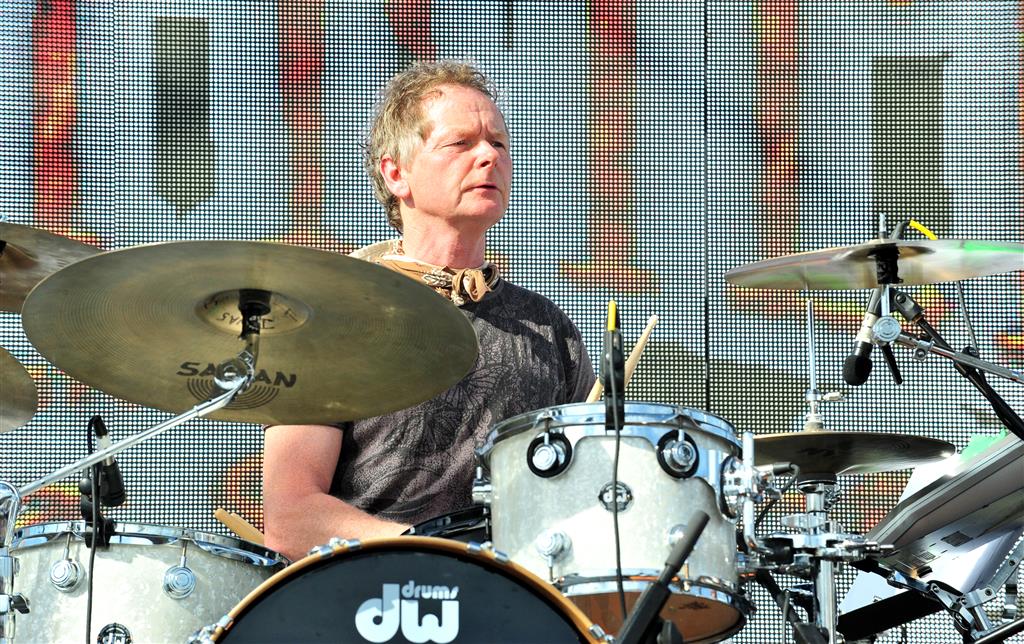 Als ik het goed begrijp zijn John, Kerry en na 2001 ook jij steeds bij deze GORGG-meetings aanwezig geweest in tegenstelling tot de broers Shulman?
Als ik het goed begrijp zijn John, Kerry en na 2001 ook jij steeds bij deze GORGG-meetings aanwezig geweest in tegenstelling tot de broers Shulman?
"Dat klopt. De Shulmans zijn totaal niet geïnteresseerd in hun verleden, alhoewel Derek door de toegenomen belangstelling voor de GG-muziek dankzij zijn hoge functie bij een platenmaatschappij zich wel heeft beijverd om een aantal albums in een speciale versie op cd uit te brengen, de zogeheten 35th Anniversary uitgaven."
Was de hele band wel betrokken bij het tot stand komen van de boxset Scraping The Barrel?
"Nee, niet de hele band. Het is als volgt gegaan. Om de naam GG in de belangstelling te houden zijn er enkele albums op cd verschenen via Alucard, eigendom van Ray, Derek en Kerry, maar de dagelijkse beslommeringen worden door Kerry en Lesley Minnear afgehandeld. Toen verscheen Under Construction, een verzameling demo's en stukjes uit oude opnamen want veel leek er niet te zijn. Dat album verkocht redelijk maar paste heel goed bij de hernieuwde interesse in de GG-muziek. Scraping The Barrel is mede mogelijk gemaakt door Dan Bornemark, zelf een begenadigd muzikant en een getalenteerde techneut. Hij is op eigen initiatief ex-GG leden gaan interviewen, onder wie Kerry, Ray Shulman en ik. Hij kwam erachter dat de originele mastertapes van diverse albums nog bestonden. Die waren namelijk eerst in mijn bezit. Toen de band uiteenviel hebben we alle spulletjes verdeeld. Derek en Ray hadden een huis in Portsmouth en waren van plan die banden weg te gooien. Ik had niet eens apparatuur om ze af te spelen maar ik gruwelde van het idee om die tapes zo maar te vernietigen, dus ik nam ze mee naar mijn huis. Toen ik besloot naar de VS te emigreren heb ik ze aan Kerry gegeven met het verzoek ze netjes te bewaren. Zo zijn die banden uiteindelijk bij Bornemark terechtgekomen die ze op de een of andere wijze allemaal heeft weten te digitaliseren. Doordat hij naar al die tapes heeft geluisterd, is hij erachter gekomen dat er heel veel extra materiaal op die banden stond en dat is de basis geworden van Scraping The Barrel. Ik heb zelf ook het nodige kunnen bijdragen dankzij mijn cassetterecorder. Toen Ray ging scheiden hielp ik hem zijn huis aan kant te maken en als bedankje kocht hij voor mij een Philips-cassetterecorder. Ik nam van alles op: sirenes in New York, het doortrekken van een WC, maar ook oefensessies van de band en stukjes die Kerry en ik uitwisselden. Omdat ik geen muziek kon lezen waren die opnamen erg handig om de partijen te leren en naast oefensessies zijn ook dat soort opnamen terecht gekomen op de boxset! Daarnaast heb ik heel veel achtergrondinformatie voor deze boxset geschreven die in het boekje terecht gekomen is."
Ben je destijds direct naar de VS geëmigreerd?
"Nee, pas twee jaar later. Ray en ik wilden in eerste instantie doorgaan met muziek maken. Punk heerste in Engeland en Ray, die altijd meeging met de nieuwe muzikale ontwikkelingen, had diverse stukjes geschreven. We hadden het project Shout gedoopt en we hadden zelfs een platencontract! Er is daadwerkelijk een single verschenen met de titel Starting Line. Mijn vrouw Judy is Amerikaanse en Ray's toenmalige vriendin, nu eega is ook Amerikaanse dus het idee was om te verhuizen naar de VS en het project daar verder te ontwikkelen. Ik had mijn huis verkocht en was goed en wel op weg richting Chicago toen Ray me kwam vertellen dat hij toch in Engeland wilde blijven. We spreken over 1982, dus dat betekende gewoon het einde van onze samenwerking. Ironisch genoeg zou het vandaag de dag geen enkel probleem zijn, maar toen lag dat helaas anders."
Wat ben je toen gaan doen?
"Ik ben in plaatselijke bandjes gaan spelen die allerlei materiaal coverden variërend van Midnight Oil tot Elvis Costello en XTC, best grappig en ik heb dat een heel lange tijd gedaan maar het bracht weinig tot niets op. Mijn vrouw is kapster en heeft haar eigen zaak dus dat was prettig. Ik heb allerlei baantjes geprobeerd, ben zelfs twee jaar automonteur geweest en heb de nodige motoren in- en uitgebouwd. Ik ben nogal praktisch ingesteld dus met mijn handen werken ging me niet slecht af."
Jouw rol bij GG was voornamelijk arrangeren of heb je ook compositorisch bijgedragen?
"Nee, dat niet. Ik zou zeggen dat ongeveer 90 procent van het materiaal werd ingebracht door Ray en Kerry, misschien ook tot op zekere hoogte door Derek want hij schreef de meeste teksten. Mijn bijdrage bestond uit het transformeren van op keyboard ingespeelde partijen naar een goed klinkend equivalent op gitaar. Zowel de ideeën van Kerry als die van Ray moesten altijd behoorlijk worden aangepast om ze speelbaar te maken op de instrumenten die uiteindelijk voor de vertolking moesten zorgen."
Jullie speelden samen heel wat instrumenten. Ook jij deed toch veel meer dan gitaar spelen?
"Ja, men noemde ons multi-instrumentalisten, maar in feite stelde dat kwalitatief niet zo vreselijk veel voor hoor. Behalve Kerry dan: hij is een uitstekende toetsenist, speelde ook cello - niet zo heel erg goed- speelde fluit - ook niet niet zo heel erg goed - maar hij was wel een fabuleuze vibrafonist en percussionist. Kerry speelde ook gitaar, heel redelijk en daarmee feitelijk ook bas, niet dat je dan gelijk Jack Bruce bent maar verder best oké. Hij vond dat overigens heerlijk om bas te spelen omdat hij, bescheiden en verlegen als hij is, dan lekker op de achtergrond kon blijven. Als je Chris Squire heet gaat dat verhaal uiteraard niet op, maar de meeste bassisten staan in de schaduw van de zanger of de gitarist, toch? Ray is ook een fantastische muzikant. Zijn baslijnen waren ongelooflijk inventief. Hij speelde ook uitstekend viool. Geen van ons speelde echt goed fluit. Ten behoeve van de concerten hebben we onszelf dat allemaal moeten leren. We speelden trouwens allemaal drums, iets wat ik zelf ook heerlijk vond."
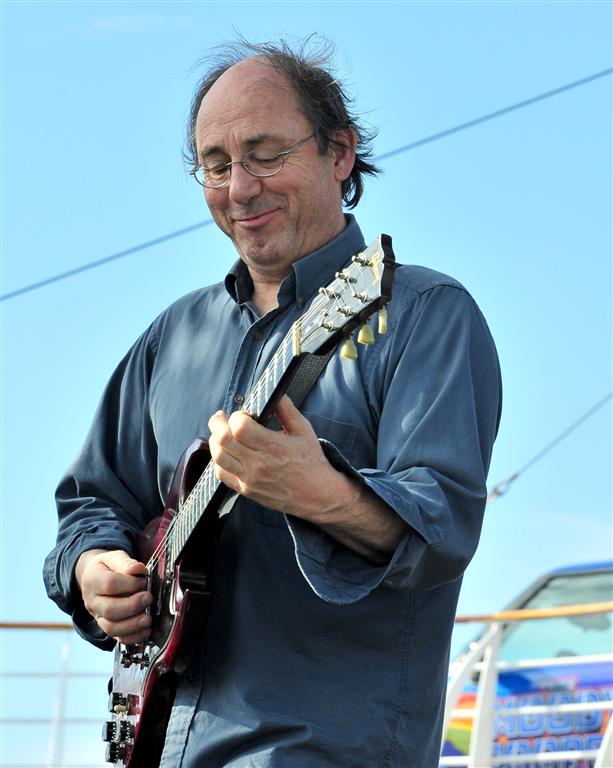 Veel tijdgenoten zijn in ernstige problemen geraakt met alcohol en/of drugsgebruik. Hoe zat dat bij GG?
Veel tijdgenoten zijn in ernstige problemen geraakt met alcohol en/of drugsgebruik. Hoe zat dat bij GG?
"Bij ons was dat geen groot probleem. Eigenlijk waren we best nette jongens. John en ik wilden nog wel eens een joint roken of een keer goed doorzakken. Misschien dat wij daarom ook eigenlijk altijd de kamer deelden en die werd dan ook steevast de feestruimte. Natuurlijk hebben we wel eens te veel gezopen en ooit heb per ongeluk een badkamer geruïneerd, maar dan heb je het ook wel gehad. We zaten toen in Italië, Phil was nog bij de band en we hadden te verstaan gekregen dat we ons om negen uur 's morgens moesten melden om een tv-show te doen met publiek. We hadden de hele dag gewacht, geen lunch, niets te drinken en uiteindelijk komt er iemand ons vertellen dat het de volgende dag zou gebeuren (spreekt met Italiaans accent): don't worry, this is Italy. We waren zo vreselijk pissig dat we naar de overkant gelopen zijn naar een bar en ons daar helemaal lam gezopen hebben, allemaal. Op de een of andere manier zijn we wel weer naar ons hotel gekomen en daar gebeurde het. Ik wilde mijn tanden poetsen en ik gleed uit, donderde achterover maar niet nadat ik met mijn voeten een raam uit zijn hang en sluitwerk had getrapt en dat zag ik uit mijn ooghoeken 'slow motion' in de badkuip vallen. Er volgde een donderend geraas alsof er een bom was afgegaan. Allemaal hoofden op de gang die kwamen loeren wat die herrie te betekenen had. Als eerste het hoofd van John Weathers die nog net kon uitbrengen 'ik was het niet hoor'! Nee hoor, wij waren best braaf, geen hard drugs, geen televisies uit ramen en dat soort zaken."
GG speelde voornamelijk in Europa en uiteindelijk ook in de VS. Met Three Friends lijkt eerder het omgekeerde?
"Correct. Ons eerste optreden buiten de VS was in Zweden. We hadden toen John Donaldson op toetsen. In eerste instantie had ik Kerry niet eens gevraagd, omdat ik me zijn afkeer van live-optredens en toeren nog goed herinnerde. In tweede instantie - tijdens de zoveelste GORGG-meeting - vroeg ik hem toch en tot mijn verbazing stemde hij toe! Het toeval wilde dat we op dat moment een aantal shows hadden geboekt en Kerry speelde voor het eerst mee in Canada, vervolgens een viertal shows in Japan, toen door naar Duitsland en tenslotte in Stockholm. Toen met zoveel reizen in een korte periode realiseerde hij zich kennelijk weer dat hij toeren helemaal niet leuk vond en hield hij het weer voor gezien. Waarschijnlijk speelde hier ook mee dat hij met een soort van gewetensconflict worstelde om GG-muziek te spelen, terwijl Derek en Ray nooit iets van 'goedkeuring' hadden gegeven aan dit project. Feitelijk hadden we hun toestemming ook helemaal niet nodig maar het was natuurlijk veel leuker geweest als ze wat enthousiaster hadden gereageerd en uitdrukkelijk hadden gesteld op geen enkele manier ons te willen dwarsbomen."
Ik zou verwachten dat ze juist heel positief zouden zijn omdat door jullie mede de muzikale erfenis van GG in ere wordt gehouden!
"Dat is ook mijn visie. Natuurlijk weet ik dat ze GG als 'hun band' beschouwen, maar er zijn wel een stel heel goede muzikanten voor nodig om die muziek te spelen dus wat dat betreft beschouw ik de GG-muziek ook wel degelijk mede die van mij. Bovendien ontvangen zij als componisten de royalties en mede door toedoen van Three Friends zijn de verkopen van de diverse albums zeer zeker gestegen! Bovendien vind ik het een schande als deze briljante muziek alleen via een geluidsdager te beluisteren is. Naar mijn mening moet die ook live beluisterd kunnen worden. Werken van alle grote componisten als JS Bach en noem maar op worden toch ook wereldwijd door uitzonderlijk goede muzikanten gespeeld? Waarom dan deze muziek niet?"
Ik ben het volledig met je eens! Hoe zit het met de diverse bezettingswisselingen?
"Dat is inherent aan dit project. Er zit geen inkomen in dus het is volstrekt hobbymatig. Om deze muziek te kunnen spelen moet je een doorgewinterde en professionele muzikant zijn en die hebben nu eenmaal ieder een eigen agenda, een eigen leven en verplichtingen die ze moeten nakomen. Lee Pomeroy bijvoorbeeld: hij speelde in Take That, speelde recentelijk nog bij Steve Hackett en moest nu kiezen tussen Three Friends en een show met Gary Barlow (van Take That), ook als soloartiest een grote ster in Engeland met een eigen oudejaarsavondshow en dergelijke. Dat schuift natuurlijk aanzienlijk meer. Het zou kunnen dat naarmate er meer optredens voor Three Friends zouden komen dat in gunstige zin gaat veranderen, maar dat is iets wat we moeten afwachten. Zijn vervanger overigens is Jonathan Noice, ook een druk bezet man die voorheen nog actief was bij Jethro Tull. Onze nieuwe toetsenist is Neil Angilley, een zelfstandige artiest maar hij deed productiewerk voor Jeff Wayne's War Of The Worlds live en was daar ook musical director. Zanger Mick Wilson heeft als voornaamste baan zijn werk bij 10CC, Malcolm is nog steeds professioneel bezig als jazz-drummer."
Eigenlijk is Three Friends dus meer een project dan een band?
"Dat is een lastige. Ieder van ons wil ontzettend graag deze muziek vertolken en we willen graag een band zijn, maar de beperking ligt in het feit dat bij ons allen brood op de plank moet komen en van een handvol optredens met dit gezelschap gaat dat niet gebeuren."
Fred Rosenkamp vult aan: "Eigenlijk is het een project, maar met de mentaliteit van een band! Gary vervolgt: "Ja dat is wat ik zocht. Geen wonder dat jij in de advertentiebranche zit!"
Hoe wordt de nummers gekozen die jullie spelen?
"Mede dankzij de ontwikkelingen in de technologie, waardoor het bijvoorbeeld mogelijk is om een trompet op een keyboard na te bootsen, zijn wij minder beperkt in wat er live gespeeld kan worden en kunnen we ook sommige stukken vertolken die veel dichter bij de originele opnamen staan. Op Pantagruel's Nativity bijvoorbeeld, gebeurt er zo veel tegelijk dat we dit nummer maar een enkele keer met GG hebben gespeeld, dus de invalshoek is zeker dat we ons vooral richten op materiaal dat in de GG-tijd niet of nauwelijks live is gespeeld. Vroeger moesten we ook vaak rekening houden met wie we speelden. Als we moesten openen voor Black Sabbath kwamen nummers als School Days er uiteraard niet aan te pas. Nu ligt dat heel duidelijk anders en spelen we tracks als The Moon Is Down. We kunnen echter niet om de krakers als Free Hand en Boys In The Band heen. Ander grappig punt is dat als ik nu naar het oude materiaal luister, ik kleine foutjes hoor die ik er met de huidige stand van technologie kan uithalen. Ook als er een nieuw bandlid komt die zijn partijen moet leren, kan ik hem precies vertellen hoe een bepaald stuk gespeeld moet worden. De multitrack opnamen van toen - in tegenstelling tot die van heden - bevatten in onze tijd vaak meer dan één instrument: soms wel zes en daardoor wordt het instuderen van een partij best bemoeilijkt."
Bestaan er plannen om nieuw materiaal te schrijven en zo ja, zal Kerry Minnear daaraan nog bijdragen?
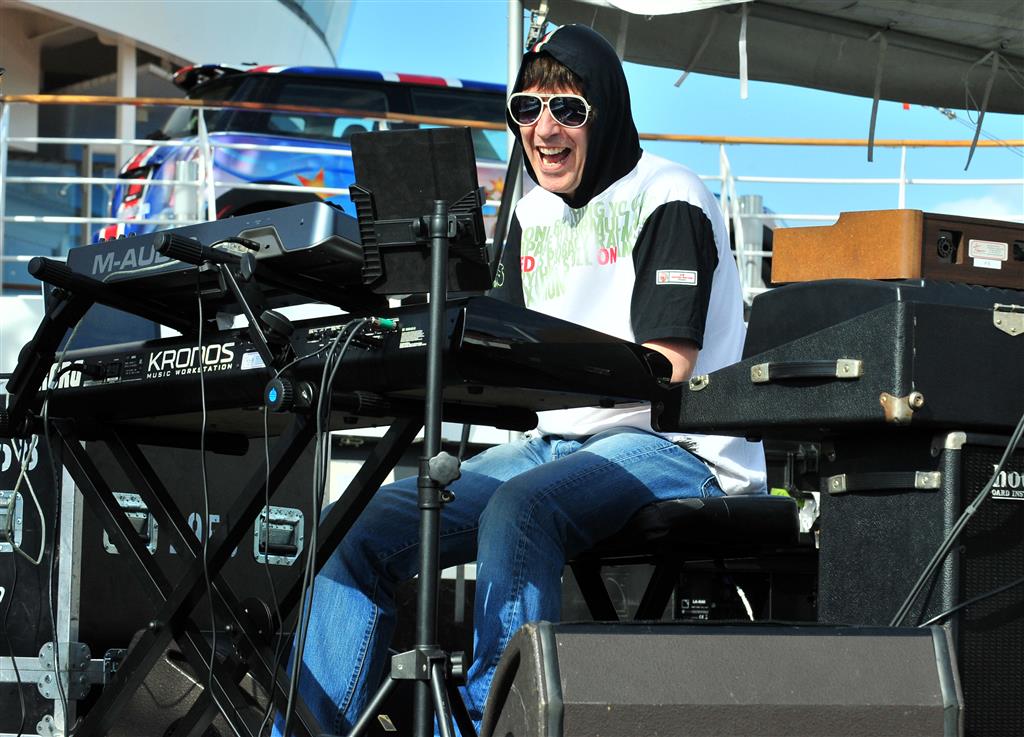 "Toevallig hebben we het daarover vanmorgen gehad! Dat is het leuke van zo'n cruise, dan kom je nog eens tot gesprekken en is er veel meer interactie. Compositorisch zal Neil, onze nieuwe toetsenman, vermoedelijk van grote invloed zijn en het was eigenlijk alsof de rest van de band auditie deed bij hem... Gelukkig vond hij ons allemaal prima, dus hij zal zich zeer waarschijnlijk storten op het schrijven van nieuwe songs. Ik heb zelf ook een aantal stukjes die gebruikt zouden kunnen worden. Kerry zal niet bijdragen, ik denk vanwege zijn gevoelens voor Ray - met wie hij nog altijd frequent contact heeft - en Derek. Bovendien kampt hij met een schrijversblok. Als Kerry zich daar doorheen worstelt, komt hij mogelijk met een eigen album. Dat hij nog steeds kan componeren is wel bewezen met zijn intro op de dvd GG at The GG."
"Toevallig hebben we het daarover vanmorgen gehad! Dat is het leuke van zo'n cruise, dan kom je nog eens tot gesprekken en is er veel meer interactie. Compositorisch zal Neil, onze nieuwe toetsenman, vermoedelijk van grote invloed zijn en het was eigenlijk alsof de rest van de band auditie deed bij hem... Gelukkig vond hij ons allemaal prima, dus hij zal zich zeer waarschijnlijk storten op het schrijven van nieuwe songs. Ik heb zelf ook een aantal stukjes die gebruikt zouden kunnen worden. Kerry zal niet bijdragen, ik denk vanwege zijn gevoelens voor Ray - met wie hij nog altijd frequent contact heeft - en Derek. Bovendien kampt hij met een schrijversblok. Als Kerry zich daar doorheen worstelt, komt hij mogelijk met een eigen album. Dat hij nog steeds kan componeren is wel bewezen met zijn intro op de dvd GG at The GG."
Hebben jullie iets van doen gehad met de recente release op het Chrysalis-label Memories Of The Old Days?
"Ikzelf sta wel heel ver van de besluitvorming over dit soort zaken af omdat ik niet betrokken ben bij Alucard. Wel weet ik dat wij alleen de rechten hebben van In A Glass House and The Power And The Glory, de rest is nog steeds van Chrysalis dus ik neem aan dat ze gewoon kunnen doen wat ze willen met al die opnamen."
Wat is jouw indruk van de huidige progscene?
"Wel, in tegenstelling tot het beruchte 'four letter word' zoals Rick Wakeman het ooit noemde, waarmee in de jaren tachtig progressieve muziek smadelijk werd afgedaan, is er nu weer respect voor de kwaliteit van de toenmalige muzikanten en hun muziek en deze ommekeer lijkt verband te houden met de mogelijkheid om financieel voordeel te behalen uit dit genre muziek. Als je nu naar de radio luistert zijn het allemaal nummers met ongeveer drie akkoorden. Het lijkt alsof niemand nog goed muzikale ideeën heeft! De huidige popmuziek, ook die van vroeger trouwens, gaat immers niet om kunst maar om geld; het is een product. Ons genre muziek is veeleer een vorm van kunst."
Ga je zelf nog wel eens naar een concert?
"Niet zo vaak als ik zou willen. Ik woon een uur of twee rijden van Chicago dus ik moet keuzes maken. Ik ben laatst wel naar The Musical Box geweest: schitterend hoe die band die oude Genesis-muziek laat herleven! Verder heb ik wat wat jazzoptredens bezocht en ben ik naar een optreden van Adrian Belew geweest. Ik zou ook nog graag eens naar Todd Rundgren gaan, temeer daar zijn gitarist Jesse Gress stukjes in een gitaarmagazine schrijft over de gitaarpartijen van GG-muziek."
Bestaan er plannen om in Europa te komen spelen?
"Dat zouden we maar wat graag willen. Op dit moment zijn er alleen nog maar ideetjes. Wel hebben we volgende week een eenmalig optreden in Portugal en op 24 oktober spelen we in het Cabaret Sauvage in Parijs, net voor de GORGG-meeting die dit jaar ook in Parijs plaats zal vinden in het weekend van 27 oktober."
Na Gary te hebben bedankt zal het mij benieuwen of er nog concerten zullen bijkomen in die periode, want dat lijkt toch niet onmogelijk. De tijd zal het leren. Liefhebbers kunnen in elk geval trachten een kaartje te bemachtigen voor het concert op 24 oktober in Parijs: een avond vol met originele Gentle Giant-muziek!
ENGLISH:
The current status of progressive rock music is characterized by a great deal of so called tribute bands even if in some cases the original artists still perform and record lik Yes, Rush, Camel and members of Pink Floyd. These tribute bands try to bring back the progressive rock music from mainly the seventies as close to the original recordings and/or live performances as possible. We have numerous tributes to Pink Floyd (Australian Pink Floyd) and Genesis (The Musical Box) who tend to generate more enthusiasm and fill more venues than a lot of progressive acts are able to achieve at present. We also see members from original bands or even reunions of bands from that era: Steve Hackett plays Genesis, Annie Haslam reformed Renaissance with new musicians, Roger Waters performs The Wall by Pink Floyd and Gary Green and Malcolm Mortimore play the music from Gentle Giant (GG).
GG may not have been as popular as Yes or Genesis, but surely this band has been an influence to many great bands like Saga, Echolyn, Hands, Spock’s Beard, Syzygy, Transatlantic and the list might be extended with a lot of other artists. If you are a subscriber to iO Pages magazine (in Dutch) you can find an article about Simon Dupree & The Big Sound in iO Pages issue 120, the foundation of what would become GG. The band wanted to refrain from hit-singles and aimed at writing more sophisticated, more complex, intelligent if you like, music and total freedom of creativity. This band began its career as GG with the Shulman brothers (Phil, Ray and Derek), Kerry Minnear, Gary Green and drummer Martin Smith. Smith was replaced by Malcolm Mortimore, but after one album Malcolm got injured in a motorcycle accident and because tour obligations had to be fulfilled, had to be replaced by John Weathers who would remain GG’s drummer until the disbanding of the band in 1980. At the end of the seventies the interest for progressive rock music became less and less and many bands called it a day or the members of those bands were forced to continue with other activities like Gryphon, Fruupp, Anyone’s Daughter, Ambrosia, Caravan, Grobschnitt, Greenslade, Kayak, Novalis, Renaissance, or take another musical direction like Genesis.
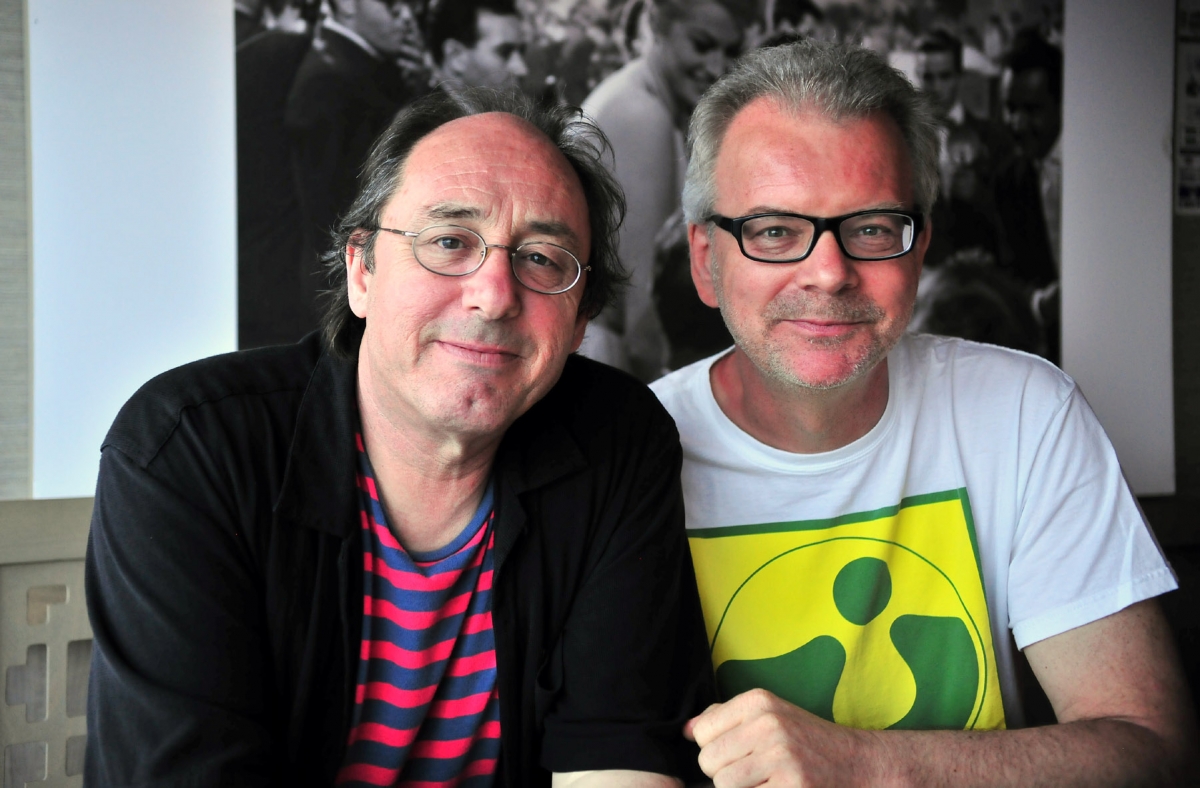 With the arrival of the internet, fans all around the globe wanted to express their admiration for GG’s music and found each other much more easily. This led to a unique fanclub: GORGG (Global On Reflection Giant Gathering). In 1999 fans from a lot of different countries gathered to celebrate GG’s music and honor the members of that absolutely unique band. It would turn out to be a huge success and these meetings were organized every year in the fall, alternatively in Europe or in North America. Especially when former members of the band started to attend the meetings, a GORGG turned out to be THE event for genuine fans of Gentle Giant. On the luxury cruise ship the MSC Divina , during the 'Cruise To The Edge' I had the privilege to have a chat with former GG-guitarist Gary Green, currently playing with Three Friends, a band that set out to perform the music of GG. A big thank you to Fred Rosenkamp, guitarist of Lady Lake, big fan of GG and faithful attendee of all GORGG-meetings. He made this interview possible.
With the arrival of the internet, fans all around the globe wanted to express their admiration for GG’s music and found each other much more easily. This led to a unique fanclub: GORGG (Global On Reflection Giant Gathering). In 1999 fans from a lot of different countries gathered to celebrate GG’s music and honor the members of that absolutely unique band. It would turn out to be a huge success and these meetings were organized every year in the fall, alternatively in Europe or in North America. Especially when former members of the band started to attend the meetings, a GORGG turned out to be THE event for genuine fans of Gentle Giant. On the luxury cruise ship the MSC Divina , during the 'Cruise To The Edge' I had the privilege to have a chat with former GG-guitarist Gary Green, currently playing with Three Friends, a band that set out to perform the music of GG. A big thank you to Fred Rosenkamp, guitarist of Lady Lake, big fan of GG and faithful attendee of all GORGG-meetings. He made this interview possible.
Gary, would you be so kind to start with telling me how GG was disbanded?
"We got together in New York to tour in the USA when both Kerry and Derek told us they wanted to quit touring. This meant this tour would practically be our last! Looking back, I think they had very good reasons for their decision: Kerry never liked playing live, was married and had little children at the time and Derek had recently been married and wanted to spend more time with his wife. Both were fed up being away from home so long every time. So in fact there were two camps: Ray, John and me wanted to continue the band and Derek and Kerry who wanted to call it a day."
Did Phil Shulman, who bowed out several years earlier play any role in making the decision to disband?
"No, not at all. Phil was much older than we were, some ten years, almost like a whole generation and he quit the band for the same reasons: being married and having young kids. Both with Simon Dupree as well as with GG he had been away from home and on the road for quite a long time. Although his parting in 1974 was amicably and with consent of all other members, still it meant a lot of strain for a short period of time. Both Ray and Derek were very upset and were thinking that without Phil there could not be a GG. On the other hand John and me wanted to continue. We all loved Phil but to be honest, Phil’s contributions on stage weren’t essential: he had a lovely voice and played saxophone but most of the compositions were coming from Ray and Kerry anyway. Derek wrote most of the lyrics. There was a short break and then we started to record In A Glass House and so things went back to normal."
I know John Weathers is suffering from cerebrospinal ataxia, a disease where one loses control over one’s extremities. He cannot play drums anymore, obviously Malcom Mortimore can: how did you get in touch withy him?
"Through the internet GG-fans started to find one and other and this led to a newsletter and the next step was the first GORGG-meeting in New York in 1999, which I didn’t attend by the way. The meeting was a great success and the fans had such a good time that they decided there should be a follow-up in London next year. I remember being called by Marc Catera if I would be able to come to the London one in 2000. And I thought ‘Oh no I don’t wanna hang around with some slobbering fans’ so I declined."
Fred Rosenkamp adds: "John Weathers, Ian Underwood, - the artist who painted the logo and the giant - were invited and decided to attend. Kerry Minnear was also invited but he was in doubt whether he would go or not. So he sent his wife Lesley ahead to check out what the meeting was all about and only when Lesley approved, Kerry decided he would go as well. (At this point Fred Rosenkamp and Gary are making faces because later Gary found out how hard it was to convince Kerry to come along!). Gary continues: "Anyway, these meeting proved to be in a very friendly atmosphere, with great respect for the musicians and the music of GG, so I was told."
So what made you decide to attend the next GORGG?
"Well, the first GORGG I attended was in 2001 in Toronto Canada. The most important reason for me to drive up to Toronto was that I knew John Weathers was coming. I hadn’t seen him for some thirty years and we lost contact. Writing letters was not done in those days, transatlantic phone calls were incredibly expensive and we didn’t have internet at the time. So my wife Judy and me drove up to Toronto and I must say, that meeting with John and the fans was a revelation for me. We spent almost a week with John and my goodness, we laughed a lot and drank a little too. And we attended the GORGGs ever since. I’m quite relieved to say that his condition sort of stabilized. He’s got an adjusted car which he manages to drive and he can still walk albeit with a stick. Anyway, a few years after that GORGG in Toronto, John decided to organize a GORGG at his place in Wales. So we went there and found out Malcolm and his wife Lynn had been invited too and I hadn’t seen Malcolm in over three decades! Malcolm had been a professional musician all those years and turned out to be a highly motivated and determined person. Because of these GORGG-meetings Malcolm had started to listen to old GG music again and subsequently had started to play some of the older songs with a few qualified musician friends of his. We had maintained contact thanks to these GORGG-meetings and so it came to be that he invited some friends and also Judy and me for a new year’s eve party at his house. I moved to the USA in the early eighties and live in Illinois, but by coincidence we happened to be in England at the time so we accepted his invitation. At some point Malcolm and a few friends started playing and during one of those jams I joined them. It sounded really awesome and Malcolm and I said to each other: we definitely should do this more often! At first this jam session evolved into the formation of Rentle Giant in 2008: just a couple of highly qualified musicians who wanted to play GG-music as a hobby. As you can imagine there were logistic problems, it’s hard to find a keyboard player actually capable of playing this music and the complexity of both music and equipment were limiting the possibilities at the time. Technology kind of overcome that problem now. When Kerry joined in 2009 we changed the name into Three Friends."
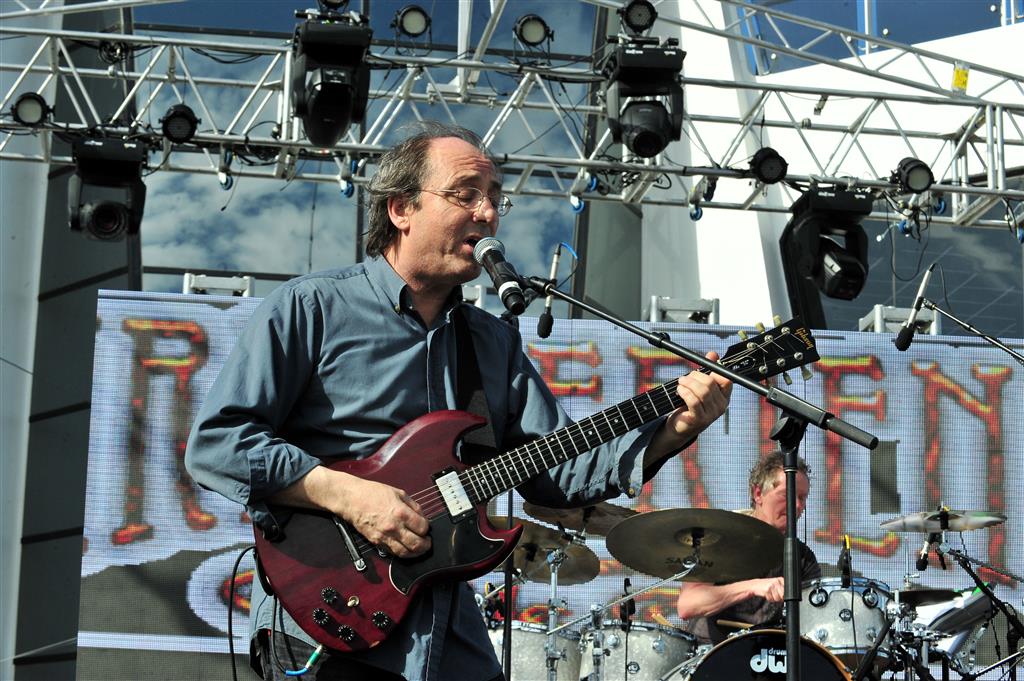 If I understand correctly you, Kerry and John have been regular guest at the GORGG-meetings, not so much the Shulman brothers. How come?
If I understand correctly you, Kerry and John have been regular guest at the GORGG-meetings, not so much the Shulman brothers. How come?
"Yes, that’s correct. Phil retired from music in 1974 and both Ray and Derek are not in the least interested to visit their past musically, although Derek, being CEO with a major record company had been able to re-release some of the GG-albums as 35th anniversary issues. Because the CD was the new format it gave him an opportunity te resell the albums on this new format."
Did the whole band participate in the making of Scraping The Barrel?
"No, not the whole band. To keep the name of GG alive, some of the GG-albums were re-issued through the Alucard label, a company owned by Ray, Derek and Kerry, although the day to day activities are carried out by Lesley and Kerry Minnear. Then the album Under Construction came out, a collection of demos and old recordings. It sold reasonably well and this release fitted perfectly in the renewed interest for GGs music and it sort of kept the name of GG in front of people. Scraping The Barrel is a box-set that could not have been realized without the input of Dan Bornemark. He’s not only a talented musician in his own right, but he's a remarkable technician too. On his own initiative he started interviewing the former members of GG. Among others Kerry and Ray and somehow he found out that the original multi-track master tapes of several albums still existed, because I saved them! You know, when the band split up we divided all GG-stuff among the members. Derek and Ray had a house in Portsmouth - it was a sort of GG headquarters - and they were actually planning to throw away all those tapes. I didn’t have a machine to listen to them, but I was horrified when I heard Ray and Derek wanted to destroy the tapes. So I took them to my house and I even built a special cupboard for them. When I decided to emigrate to the USA, I gave them to Kerry and told him he should take care of them from that moment on. During the interviews Dan asked Kerry if he could use the tapes and Kerry gave his permission. Dan managed to digitize all of them, don’t ask me about the process, I know he took them to studio and I think it’s called ‘baking the tapes’ but at any rate he saved what was on those tapes for the next generation. By listening to all the tapes he was able to separate all available tracks and he found out there was quite a lot of extra material! This turned out to be the starting point to conceive the project Scraping The Barrel. Because I had been saving all cassettes of recordings made in the seventies, I have actually contributed quite a lot of material that ended up in that box-set and of course I wrote a lot of background stories for the booklet. Apparently I had been the archivist of the band. The cassette recorder was a gift from Ray by the way. When Ray got divorced I helped him move out and clean the house and in return Ray bought me that Philips cassette recorder. I recorded loads of stuff: sirens in New York, flushing a toilet, cymbals in the bath tub you name it. But, I also recorded rehearsals from the band and parts Kerry and I exchanged. Because I can’t read notes, these recordings were a big help to me in order to learn the parts I was supposed to play and to try out different things."
Did you emigrate to the USA right after the disbanding of GG?
"No, only two years later. Ray and I wanted to continue making music together. Punk ruled Britain and Ray always had a good feel for fashion and a good ear of what would be the right kind of music or sound at the time. He had written several pieces and we called ourselves Shout. We even had a record deal! We were able to release a single entitled Starting Line. My wife Judy is American and Ray’s wife, then girlfriend, is also American so the plan was to emigrate to the USA and develop this project further there. I had sold my house and my furniture was halfway the Atlantic and I was well on my way to the Chicago-area when Ray told he’d rather stay in England. We’re talking 1982: no internet, ridiculously expensive phone calls so this meant the end of our collaboration. It sort of dissolved in disinterest... Ironically, today this distance would be no problem at all but some thirty years back it really was."
What did you do then?
"I got to play in numerous local (cover)bands playing material from Midnight Oil, XTC, Richard Thompson and Elvis Costello, just to name a few. I lived in a sort of musical desert where Bob Seger ruled and The Tubes. I did that for quite a long time but as fun as it was, it didn’t make me much money. Fortunately my wife is a hairdresser and she has her own shop so that helped a lot. Subsequently, I had a handful of different jobs. I was a mechanic for two years, repaired a lot of cars, took a lot of engines out. I’m a very practical guy so all jobs hands on were suitable for me."
Your role within GG was mainly arranging songs, not so much composing. Is that correct?
"I guess that’s about right. I’d say about 90% of all the music came from Ray and Kerry, and from Derek to some extent, lyrics wise. My contribution was mainly to adept their music, mostly composed on a keyboard into something that could be played on a guitar. The ideas from both Kerry and Ray had to be adjusted quite extensively to make them physically playable on a guitar and other instruments. So my contribution was mainly interpretation: making somebody else’s music playable for others."
You guys played a lot of different instruments didn’t you? You yourself played other instruments, am I right?
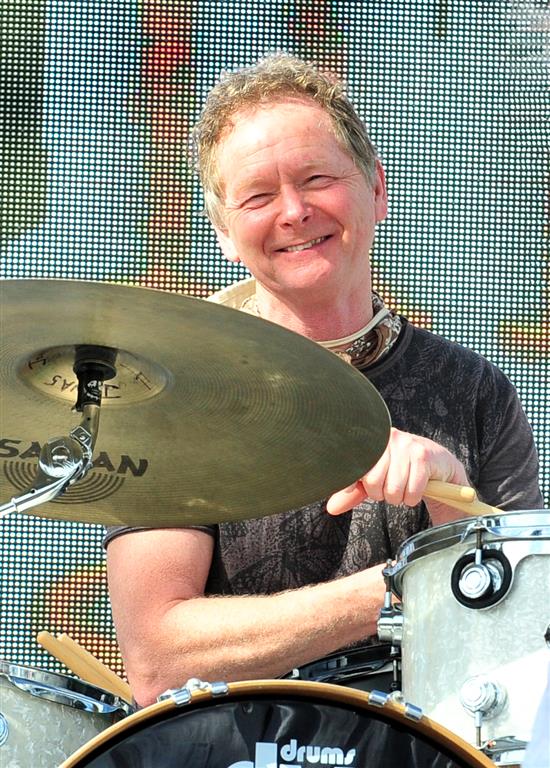 "Yeah, we were called multi-instrumentalists, but to be honest, if you consider the level on which we were playing those other instruments it wasn’t too big a deal, with the exception of Kerry: he is an outstanding keyboard player, played also cello - not very well -, played recorder – also not very well- but he played the vibraphone really good and he was a great percussionist. Kerry played guitar too, he did that rather well I might add. By extension he played the bass as well and that was something he particularly liked. Not that he was playing like Jack Bruce all of a sudden, but he did okay and he loved it because he could stand at the back of the stage. If you are Chris Squire, it’s a different story but most bass players are standing in the shade and let the spotlights shine on the vocalist or the lead guitarist, right? Ray is also an incredible musician. His bass lines were so good, so inventive! He was also a very good violinist. None of us played recorder very well. For the shows we all had to learn how to play the arrangement Kerry wrote! By the way all of us played the drums. I really loved that."
"Yeah, we were called multi-instrumentalists, but to be honest, if you consider the level on which we were playing those other instruments it wasn’t too big a deal, with the exception of Kerry: he is an outstanding keyboard player, played also cello - not very well -, played recorder – also not very well- but he played the vibraphone really good and he was a great percussionist. Kerry played guitar too, he did that rather well I might add. By extension he played the bass as well and that was something he particularly liked. Not that he was playing like Jack Bruce all of a sudden, but he did okay and he loved it because he could stand at the back of the stage. If you are Chris Squire, it’s a different story but most bass players are standing in the shade and let the spotlights shine on the vocalist or the lead guitarist, right? Ray is also an incredible musician. His bass lines were so good, so inventive! He was also a very good violinist. None of us played recorder very well. For the shows we all had to learn how to play the arrangement Kerry wrote! By the way all of us played the drums. I really loved that."
Many of your contemporary fellow-artists got into trouble with alcohol or drug addictions. How were things with GG?
"Actually it never has been a real issue within the band. In fact we were quite good lads! Admitted John and I liked to smoke a joint occasionally or got drunk once in a while. That’s why John and me shared the room many times and as you can imagine our room always was the party room. Of course there have been a few occasions we got really drunk. I remember once I wrecked a bathroom in a hotel, purely by accident! We got a bill for wrecking a bathroom because the sink fell in. At the time we were in Italy, Phil was still a member of the band and we were told to report at some TV-studio at nine o’clock in the morning to perform some of our music with an audience. We were waiting and waiting and nothing happened. No lunch, no drinks, nothing! At the end of the day a guy rushes in and tells us with a smile on his face that the show was scheduled for the next day and he added (speaks with an Italian accent) ‘don’t worry this is Italy’! We were all so pissed off that we went straight across the street to the first bar we saw and got drunk. Somehow we managed to find our hotel again and there it happened: I was brushing my teeth and I slipped, fell into the bathroom, my feet went up and I hit this giant window sitting on hinges and I saw it coming slow motion disintegrating the sink completely like a bomb went off! All those heads coming round the door from the corridor and people came from everywhere to see what the noise was all about, but the first head popping up was John Weathers who couldn’t stop laughing, but managed to say something like ‘it wasn’t me’! Looking back we were a very nice group of people: no hard drugs, no throwing TV’s from the windows or anything like that."
With GG you played mainly in Europe, although eventually also in the USA. With Three Friends the opposite seems to be the case?
"Yes, we toured in Europe extensively with GG: UK of course, Germany was good for us, Italy was fantastic. Our first ever gig outside of the USA was in Sweden. Our keyboard player at the time was John Donaldson. At first I didn’t ask Kerry to join, because I knew he never really liked playing live, so I thought ‘why bother’? When I met him at one of the GORGG-meetings I told him about the band and to my utmost surprise he told me he was interested to join! So all of a sudden we had two keyboard players. Kerry played his first gig in Canada, went back to England but the next day we flew to Japan to do four shows in Tokyo and in a quick succession there were four shows in Japan and we went right through to Germany (Würzburg) and lastly a show in Stockholm. All these shows were in a quick succession which made him realize how he hated touring and backed out again. I believe there was another reason why he didn’t want to continue with Three Friends and that is because he had a twinge of conscience: Ray and Derek never formally gave their approval to this project.
That surprises me: after all you are promoting the music of GG big time!
"Well that’s my point of view too. I know they look upon GG as ‘their’ band, but it takes a group of very talented and devoted musicians to play this music, so in a way I consider GG-music also to be my music. You know, we didn’t need to have their permission, but it would have been so much nicer if they would have given us their blessing or at least their not obstructive involvement. We are promoting GGs music and I’m quite sure we have been contributing to the renewed interest and surely have had and still have a positive influence on the worldwide sales of all GG-albums for which they get their royalties... Besides, I think it’s a shame this brilliant music could only be heard via some sound carrier albeit vinyl, cd or download. This music should be listened to live! We listen to works of composers like JS Bach every day, played live by the finest orchestras and virtuoso musicians throughout the whole world. Why would this music be so different?"
I totally agree with you Gary, it’s awesome to finally hear GG-music played live, because I for one, never had an opportunity to go and see GG live! Now, what can you tell us about the changes in the line-up of Three Friends?
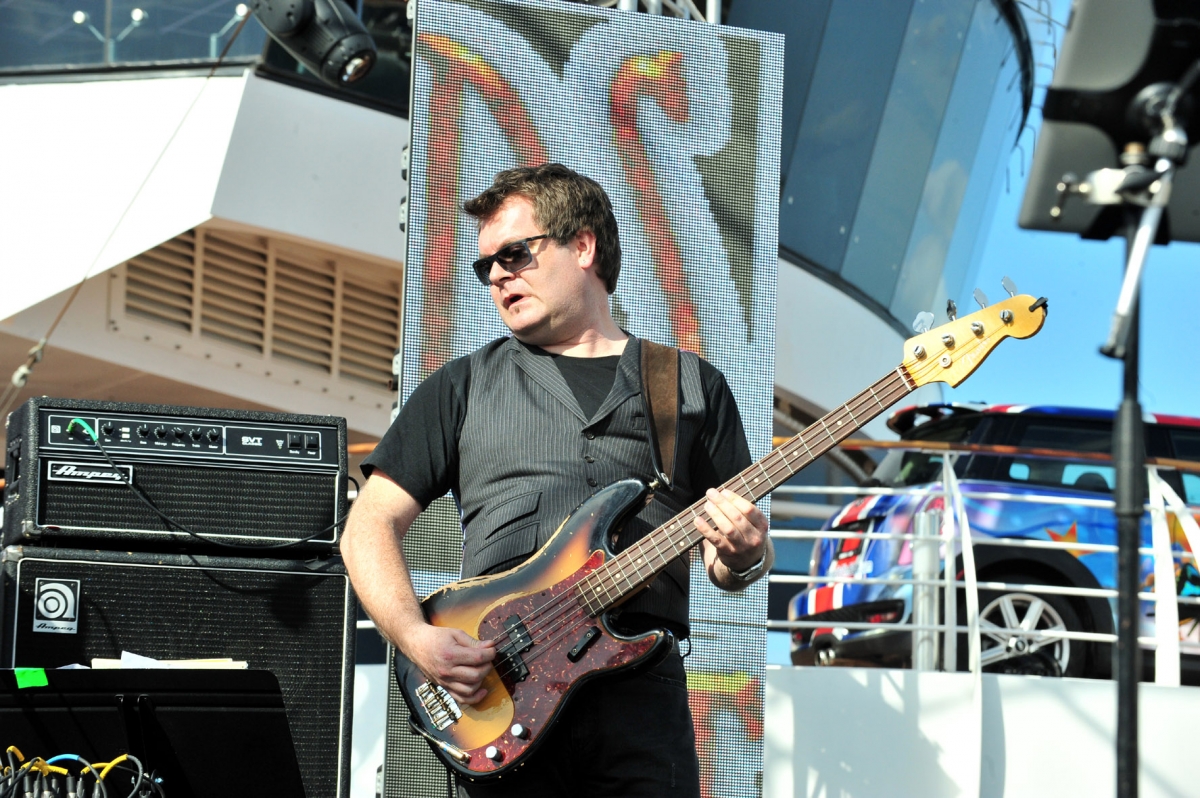 "I’m afraid that’s got to do with the project as it is today: strictly hobby, there’s no money in it. To be able to play this music you’ve got to be a highly qualified professional musician and this type of musicians have their own agendas. They have families, mortgages to pay off so they have to work to make a living, preferably the kind of work that pays bills. Lee Pomeroy for instance plays in Take That and recently he played in Steve Hackett’s band. He had to choose between this cruise and a gig with Gary Barlow (Take That), a huge star in England, with his own new year’s eve conference among others. The paycheck of this gig must be a lot higher than what he would get playing with Three Friends. His replacement is Jonathan Noice, also a very busy man who played with Jethro Tull not too long ago. If there would be more shows for Three Friends, things might be different then. Our new keyboardist is Neil Angilley, an artist in his own right but he did production work on Jeff Wayne’s War Of The Worlds Live and he has been the musical director. Singer Mick Wilson’s primary job is being vocalist for 10CC, but he has his own thing as well. Malcolm is still a professional jazz-drummer."
"I’m afraid that’s got to do with the project as it is today: strictly hobby, there’s no money in it. To be able to play this music you’ve got to be a highly qualified professional musician and this type of musicians have their own agendas. They have families, mortgages to pay off so they have to work to make a living, preferably the kind of work that pays bills. Lee Pomeroy for instance plays in Take That and recently he played in Steve Hackett’s band. He had to choose between this cruise and a gig with Gary Barlow (Take That), a huge star in England, with his own new year’s eve conference among others. The paycheck of this gig must be a lot higher than what he would get playing with Three Friends. His replacement is Jonathan Noice, also a very busy man who played with Jethro Tull not too long ago. If there would be more shows for Three Friends, things might be different then. Our new keyboardist is Neil Angilley, an artist in his own right but he did production work on Jeff Wayne’s War Of The Worlds Live and he has been the musical director. Singer Mick Wilson’s primary job is being vocalist for 10CC, but he has his own thing as well. Malcolm is still a professional jazz-drummer."
So actually Three Friends is rather a project than a band?
"Now that’s a tough one! You know, everyone of us really want to perform this music and we would like to be a band, but the limitations are obvious: everyone has to make a living and that will not happen with a handful of shows per year! But there’s a fairly good chance that the band will be like this for some time. There are other ways to support musicians nowadays like Kickstarter and Pledge Music and stuff so maybe we can build something around that kind of thing."
Fred Rosenkamp comments: "Three Friends is a project but the members have the mentality of a band. Gary nods and states: yes that’s a neat way to put it, thank you Fred! I can see why you are in the advertising business."
How are the songs picked the band is going to play?
"Well, because of the huge advances in technology it’s possible to create a trumpet sound through a keyboard for example, so this enables us to play songs GG hardly played live if ever. Also some songs can be performed closer to the original recording due to these advances in technology. In the song Pantagruel's Nativity there's a lot of things going on at the same time so I think we played that song with GG just a couple of times. In the old days we also had to consider who we were playing with. We definitely couldn’t play a song like School Days when we had to open for Black Sabbath. Now things are different and we can play a song like The Moon Is Down. So we are aiming at playing songs GG hardly played live or even never played live and to perform some songs closer to the original recordings. Of course we can’t get around playing tracks like Free Hand and Boys In The Band. Funny thing is that when I listen to the old material with the technology of today, I hear these little irregularities, tiny mistakes in timing and so on. When the band embraces a new band-member I’m able to tell him exactly how to play a specific part. On the multi-track recordings in the seventies there were often more than one instrument: sometimes up to six which makes it much harder to practice on a certain piece."
Do you have any plans to write and record new material and if so, will Kerry Minnear be contributing?
"It so happens that we have been discussing this right this morning! That’s the great thing about this cruise: there’s time to talk things over, to make plans and there's a lot of interactions. In my opinion our new keyboard player Neil will be of major importance as a composer. Looking back it seems we were rather auditioning for him than he for us. Luckily he thinks we’re all okay so I believe he will probably be starting to write new songs shortly. I have bits and pieces ready to be used as well. I don’t think Kerry will be contributing because of his feelings towards Ray, whom he is in contact with frequently, as well as with Derek. Besides, as far as I know he suffers some kind of writers-block. If he manages to deal with that he will probably come up with a solo album."
His contribution on the DVD GG at the GG, that beautiful intro, proves that he's still able to compose a great tune! Did the members of GG have anything to do with the latest Chrysalis release Memories Of The Old Days?
"Speaking for myself, no. I have never been involved in decision making processes, because I’m not participating in Alucard. I only know we have the rights for In A Glass House and The Power And The Glory, all other recordings are still owned by Chrysalis, so my guess is, that they are free to do with those recordings as they please."
What’s your impression of the current prog scene?
"Well, in contrast to the infamous four letter word used to describe progressive music in the eighties, according to Rick Wakeman, nowadays there’s respect for this genre of music as well as for the musicians who were playing this kind of music. It could be this turnaround has got something to do with the ability to make money from the prog genre. If you listen to the radio nowadays it’s only songs with a mere three notes… As if no-one has any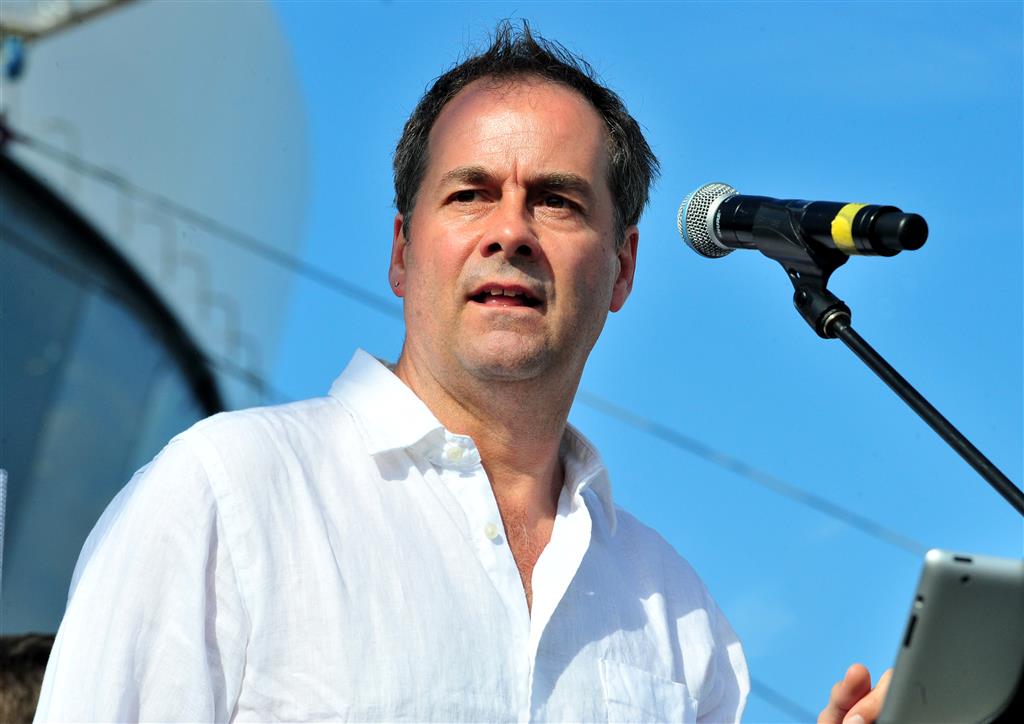 ideas left! The current pop music - maybe even back then it was the same - is not about the art, it’s all about money. It’s a product, nothing more. Our genre of music is much more a form of art."
ideas left! The current pop music - maybe even back then it was the same - is not about the art, it’s all about money. It’s a product, nothing more. Our genre of music is much more a form of art."
Do you go to concerts yourself?
"Not as much as I would like! I live about two hours driving from Chicago so I have to make choices. I went to see The Musical Box recently. It’s really amazing how they recapture the music and the atmosphere of the old Genesis-songs! I also went to see Adrian Belew and several jazz concerts. I’d love to see Todd Rundgren, also because his guitarist, Jesse Green, has been writing pieces about the guitar parts in GG-music in a guitar magazine."
Are there any plans for touring in Europe?
"We would surely like to! At the moment there’s a couple of ideas, nothing more. Next week we have a one time event, we’re headlining the Saturday of the Gouveia Art Rock festival in Portugal and on October 24 we will play at the Cabaret Sauvage in Paris, just before the GORGG that will be held in Paris as well in the weekend of October 27."
Huge thanks to Gary Green and Fred Rosenkamp and if there won’t be other dates in the fall all GG and Three Friends fans should get themselves a ticket for the show in Paris, Cabaret Sauvage on the 24th of October!